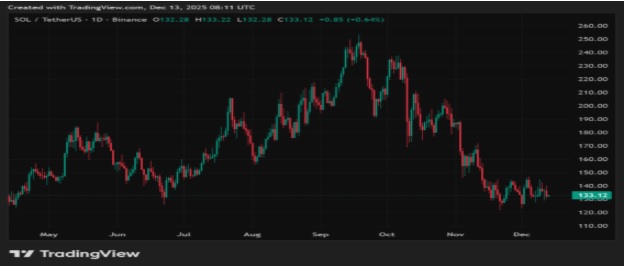Pyth Network (PYTH): A Strategic Buy as It Becomes the On-Chain Data Backbone of the U.S. Economy
- U.S. Department of Commerce partners with Pyth Network to publish GDP data on nine blockchains, marking first government-endorsed onchain economic data distribution. - Collaboration under "Deploying American Blockchains Act" aims to position U.S. as blockchain governance leader, aligning with Trump’s vision for "blockchain capital of the world." - PYTH surged 70% post-announcement, driven by institutional credibility and low-latency oracle tech, with Q1 2025 TTV reaching $149.1B. - Government-backed use
The U.S. Department of Commerce’s partnership with Pyth Network (PYTH) marks a seismic shift in how economic data is disseminated and utilized. By publishing quarterly GDP data on nine major blockchains—including Bitcoin , Ethereum , and Solana—Pyth has become the first decentralized infrastructure provider to verify and distribute official U.S. economic metrics onchain [1]. This collaboration, part of the broader “Deploying American Blockchains Act,” is not merely a technical upgrade but a strategic move to position the U.S. as the global leader in blockchain-driven governance [2]. For investors, this represents a rare convergence of institutional validation, macroeconomic utility, and long-term infrastructure value.
Government-Endorsed Utility: A New Era of Trust
The U.S. government’s adoption of Pyth underscores its commitment to leveraging blockchain for transparency and accessibility. By publishing GDP and PCE Price Index data onchain, the Department of Commerce ensures these metrics are immutable, programmable, and globally accessible [3]. This eliminates intermediaries and reduces the risk of data manipulation, a critical advantage in an era of geopolitical uncertainty. Secretary of Commerce Howard Lutnick has explicitly tied this initiative to President Trump’s vision of making the U.S. the “blockchain capital of the world,” aligning Pyth with broader legislative efforts like the GENIUS Stablecoin Act [4]. Such endorsements signal a durable, government-backed use case for PYTH, insulating it from speculative volatility and positioning it as a foundational asset in the DeFi ecosystem.
Market Response and Technical Advantages
The market has already priced in Pyth’s institutional credibility. Following the partnership announcement, PYTH surged over 70% in 24 hours, with trading volumes spiking by 2,700%. This surge reflects confidence in Pyth’s technical architecture, particularly its pull oracle model, which allows users to request price updates on demand. Unlike push-based oracles, this model reduces gas costs and improves scalability, making it ideal for high-frequency DeFi applications. Pyth’s low-latency solution, Pyth Lazer, further solidifies its edge by delivering market data in milliseconds—a critical feature for real-time trading and synthetic asset protocols.
Long-Term Infrastructure Value
Pyth’s value proposition extends beyond GDP data. The network plans to expand its onchain datasets to include inflation metrics, employment figures, and other macroeconomic indicators. This expansion will enable developers to create novel financial products, such as inflation-linked tokens and derivatives tied to U.S. economic performance. DeFi platforms like Drift and Synthetix already rely on Pyth for accurate price feeds, and the U.S. government’s endorsement will likely accelerate adoption across TradFi and DeFi.
In Q1 2025, Pyth’s Total Transaction Value (TTV) reached $149.1 billion, a 376.6% year-over-year increase, reflecting its growing role in the $1.2 trillion DeFi market. While TTV declined 14.9% quarter-over-quarter, this dip is more indicative of broader market conditions than Pyth’s fundamentals. Analysts project continued growth, driven by its first-mover advantage and institutional validation.
Strategic Investment Rationale
For investors, Pyth’s partnership with the U.S. government offers a unique opportunity to bet on the future of data infrastructure. Unlike speculative tokens, PYTH is underpinned by a tangible, government-sanctioned use case that aligns with the Trump administration’s blockchain agenda. The token’s surge post-announcement demonstrates strong retail and institutional demand, while its technical architecture ensures scalability and efficiency. As the U.S. expands its onchain data initiatives, PYTH is poised to become a critical asset in the DeFi ecosystem, offering both short-term liquidity and long-term value.
Source:
[1] The U.S. Department of Commerce is Working with Pyth
[2] Chainlink and Pyth Selected to Deliver U.S. Economic Data
[3] U.S. Government Starts Pushing Economic Data Onto
[4] The U.S. Government's Onchain Data Initiative and Its
[5] PYTH goes parabolic as Trump admin taps blockchain
[6] Deep Dive into Pyth Network
[7] State of Pyth Q1 2025
[8] The U.S. Department of Commerce is Working with Pyth Network
[9] US government partners with Chainlink, Pyth Network to deliver onchain data
[10] State of Pyth Q1 2025
[11] Pyth Network (PYTH) Price: Explodes 70% on US Government Partnership
Disclaimer: The content of this article solely reflects the author's opinion and does not represent the platform in any capacity. This article is not intended to serve as a reference for making investment decisions.
You may also like
SLX will launch on Legion on December 22, the Winter Solstice.

Alarming Surge: South Korean Crypto Exchanges Face Record 1.15 Million Hacking Attempts
CMTA Adopts Chainlink Interoperability Standard for Cross-Chain Tokenized Assets
